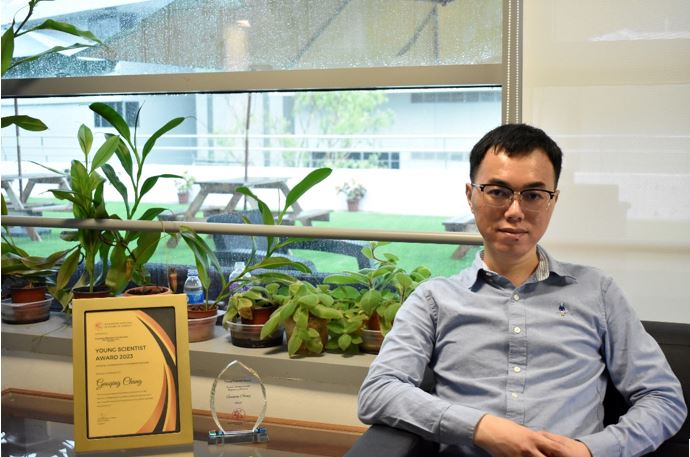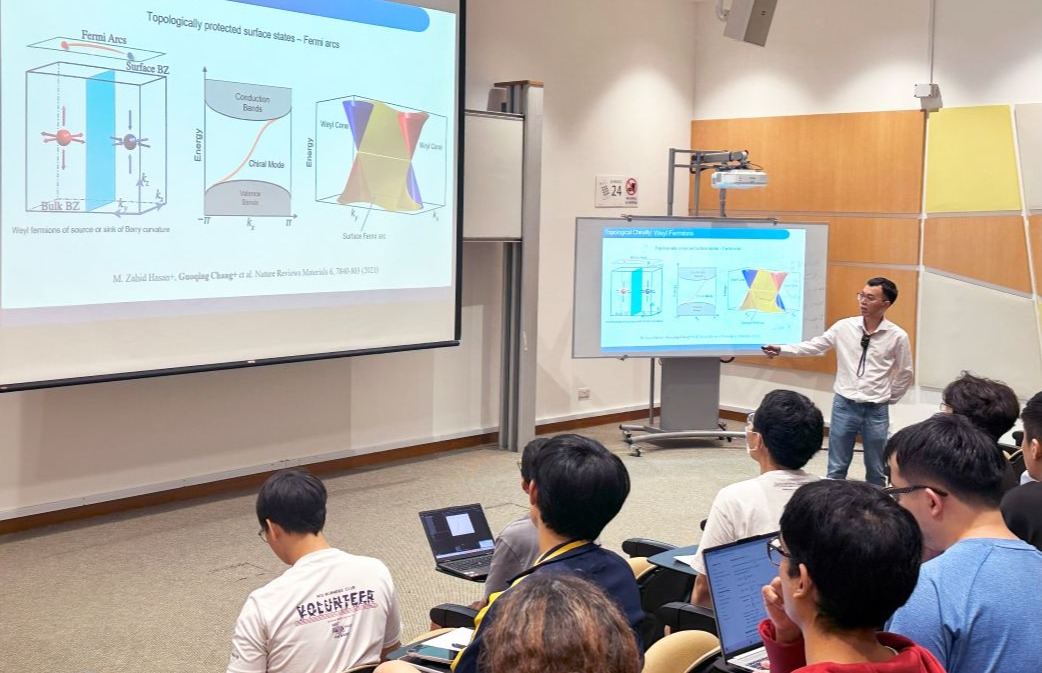2023 Young Scientist Award: Nanyang Assistant Professor Chang Guoqing
A candid conversation with Dr Chang about his personal journey to becoming a winner and overcoming research challenges

Interviewed by: Cui Peiyuan and Peng Bo | SPMS Graduate Students’ Club, March 2024
Nanyang Assistant Professor Chang Guoqing, a faculty member at the NTU School of Physical and Mathematical Sciences, received the prestigious 2023 Young Scientist Award for
his groundbreaking contributions to the study of quantum materials, particularly the development of topological quantum semimetals. The Young Scientist Award is awarded annually by the Singapore National Academy of Science (SNAS) and National Research Foundation (NRF) to Singapore-based scientists and engineers, aged 35 or below, who have produced outstanding research in their respective fields of expertise.
Dr Chang is also the winner of the 2023 MIT Technology Review Innovators Under 35 Asia Pacific. His research mainly explores the electronic, magnetic, and optical properties of various topological phases of matter. With nearly a hundred publications to his name, including Nature and Science, his research has left a notable impact on the scientific community. In our conversation with him, he shared some interesting experiences in his research career, and gave some beneficial ideas to younger researchers. Here are some highlights of our interview:
Dr Chang, what initially drew you towards a career in science? Could you share your journey into research from undergraduate to becoming a professor?
First and foremost, a deep-seated curiosity about the world has always been the driving force behind my scientific endeavours. However, I've learned that curiosity alone is not sufficient to achieve one's goals in this field. Identifying one's strengths is equally crucial.
Reflecting on my own journey, my fascination with the physical world began at a young age, leading me to aspire to become a physicist. However, the path to identifying my niche within physics was not immediate. During my master's program, I dedicated two years to experimental research. This period was pivotal as it revealed that my strengths did not lie in hands-on experimentation. Instead, I found my calling in theoretical physics, particularly due to my aptitude for heavy numerical calculations. This realisation steered me towards specialising in the theoretical study of topological phases of matter during my PhD.
This blend of curiosity and self-awareness has been instrumental in shaping my academic career, guiding me from an undergraduate student to my current position as a professor.
What would you do when you are not getting the expected outcomes?
First, I will be patient and check all the steps in my calculation to see if there is an error in my calculation or derivation. Second, I will use at least one more approach to see if they will give the same unexpected results. If the results you get are the same as the previous one, I will be happy. This means you have discovered a new physics.
Could you share a particularly challenging moment or obstacle you faced during your research journey, and how did you overcome it? What lessons did you learn from that experience?
Facing and surmounting technical difficulties is a fundamental aspect of a researcher's formative years. My guidance for those new to the field encountering these hurdles is direct: approach them with determination. While this path may seem intimidating and is often laden with setbacks, it serves as an essential initiation into the realm of research. Engaging with these challenges head-on not only promotes learning but also mitigates technical obstacles as one becomes more adept within their area of study.
Yet, it's crucial to recognise that while technical challenges are prevalent, they don't represent the pinnacle of research difficulties. The essence of research lies in the ability to identify significant and attainable questions. This skill — the capacity to craft a question that is both impactful and addressable with current methodologies — stands at the core of scientific inquiry. It transcends basic technical knowledge and ultimately determines the scope of one's contributions to science.
What are your thoughts on the potential real-world applications of topological materials?
As a theoretical physicist, my primary focus lies in uncovering novel
mechanisms within physics. These discoveries could potentially pave the way for
future applications. However, it's important to acknowledge that the practical,
real-world application of these newfound principles is not always guaranteed.
What we can do, and what I believe is essential, is to communicate and advocate
for our theoretical advances within the engineering community. By generating
interest and understanding among engineers regarding the concepts we physicists
explore, we can bridge the gap between theoretical physics and practical
applications, fostering an environment where potential real-world applications
of topological materials can be more readily realised.

Congratulations on winning the 2023 Young Scientist Award, what do you believe were the key factors or contributions that led to you being recognised with this prestigious 2023 Young Scientist Award?
Thank you for the congratulations! Rather than attributing my recognition to a single piece of work, I believe it was my consistent contributions to the field of topological quantum materials that culminated in receiving the prestigious 2023 Young Scientist Award. Research, in essence, resembles a marathon more than a sprint. Persistent effort, dedication, and incremental advancements in understanding are key. By continuously contributing and maintaining a steady pace in research, recognition naturally follows as the community begins to acknowledge and value your work. This award reflects the cumulative impact of years of focused study and collaboration in the ever-evolving landscape of quantum materials.
Looking ahead, what are your upcoming research goals or projects, and how do you envision your contributions shaping the future of your field?
Currently, my focus continues to be on advancing the exploration of topological chiral crystals. But for the long term, I am trying to address unresolved questions within the field that have yet to be solved, as I believe they warrant some attention.
 Dr Chang giving the talk on topological chiral crystals at the IAS Discovery Science Seminar for graduate students.
Dr Chang giving the talk on topological chiral crystals at the IAS Discovery Science Seminar for graduate students.
I can see that being a professor is very busy, so how do you manage work-life balance?
It's tough, no denying that. I will remind myself to take breaks and spend quality time with my family. However, there are times when the workload becomes overwhelming and takes precedence.
Do you have any advice for PhD students who are struggling in their research work?
First, do not be shy. Talk more to people who are senior to you.
Second, remember to stay calm. Life isn't always smooth sailing, and research is full of ups and downs. Learning to calm down and focus is very helpful.
Thanks for your time, Dr Chang, we truly appreciate our conversation today.














/enri-thumbnails/careeropportunities1f0caf1c-a12d-479c-be7c-3c04e085c617.tmb-mega-menu.jpg?Culture=en&sfvrsn=d7261e3b_1)

/cradle-thumbnails/research-capabilities1516d0ba63aa44f0b4ee77a8c05263b2.tmb-mega-menu.jpg?Culture=en&sfvrsn=1bc94f8_1)






